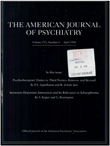Cardiac denervation and cardiovascular reactivity to psychological stress
Abstract
OBJECTIVE: This study investigated the mechanisms responsible for increases in heart rate and blood pressure during psychological stress, which are incompletely understood. Since cardiac transplant patients have denervated hearts, they provide a unique model for isolating central versus peripheral influences on the cardiovascular response to stress. METHODS: The authors compared the responses to two laboratory stressors of 20 ambulatory heart transplant recipients and two groups of normal subjects, one whose ages were matched to the ages of the transplant patients (mean = 46 years) and one whose ages were matched to the ages of the heart donors (mean = 27 years). The three groups of subjects performed mental arithmetic and reaction time tasks. RESULTS: Heart rate increase during the mental arithmetic task was significantly attenuated in the transplant recipients. During stress, stroke volume increased in the transplant recipients but decreased in both groups of comparison subjects. The difference in age between the heart recipients and donors did not account for the difference in reactivity between the heart transplant patients and the normal subjects. CONCLUSIONS: Direct neural stimulation of the heart is more important than peripherally circulating factors in producing tachycardia during psychological stress. Cardiac but not vascular responses to psychological stress are altered by cardiac denervation.
Access content
To read the fulltext, please use one of the options below to sign in or purchase access.- Personal login
- Institutional Login
- Sign in via OpenAthens
- Register for access
-
Please login/register if you wish to pair your device and check access availability.
Not a subscriber?
PsychiatryOnline subscription options offer access to the DSM-5 library, books, journals, CME, and patient resources. This all-in-one virtual library provides psychiatrists and mental health professionals with key resources for diagnosis, treatment, research, and professional development.
Need more help? PsychiatryOnline Customer Service may be reached by emailing [email protected] or by calling 800-368-5777 (in the U.S.) or 703-907-7322 (outside the U.S.).



